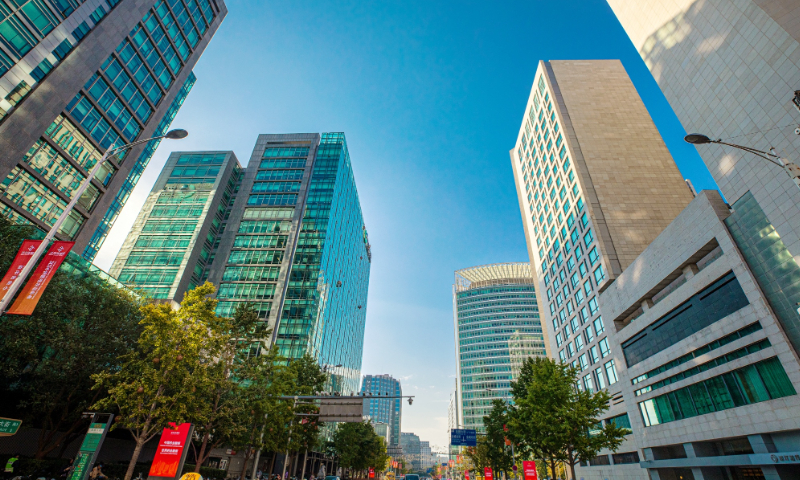
A street view of the Annual Conference of Financial Street Forum (FSF) 2024 in Beijing Photo: Courtesy of FSF
Editor's Note:Seventy years ago, a group of far-sighted British, represented by Jack Perry Senior, broke the ice and opened the door to developing China-UK trade, paving the way for enduring friendly exchanges. Over the decades, the "icebreaking" spirit carries on and contributes to fostering broad connections between the two countries. At the critical moment for China-UK relations, Global Times reporter Ma Jingjing (GT) interviewed Jack Perry Junior (Perry), chairman of the 48 Group Club and CEO of London Export Corp to seek his insight on China's economic development and improving China-UK relations. The interview was conducted during the Financial Street Forum 2024 held in Beijing from Friday to Sunday.

Jack Perry Junior, chairman of the 48 Group Club Photo: Courtesy of Jack Perry Junior
GT: China's economy grew by 4.8 percent year-on-year in the first three quarters this year. What's your take on China's growth prospects?
Perry: If you want to understand China, you need to go to China. I recently traveled to East China's Anhui Province, which used to be a very poor province but its GDP is soaring now. I asked them how they achieved this, and they told me "We have kept solving problems." To me, that's the essence of the Chinese people. They are problem solvers.
Those who claim China's economic growth rate has peaked do not know China, actually. China is one of the most long-term forward-thinking countries in the world.
Currently, the world economy is going through some troublesome times, not just China's economy. However, the Chinese leadership possesses profound long-term strategies, embodied by the development of new quality productive forces, and I believe they will position China for remarkable success in the future.
GT: China keeps expanding reform and opening-up in recent years, especially after the Third Plenary Session of the 20th Central Committee of the Communist Party of China charted a blueprint for China's high-quality development. How do you think of China's opening-up efforts in recent years?
Perry: China has been opening up well for more than 40 years. China's stability is the foundation of who they are. China closes the gap with other major economies in an amazing speed in certain areas such as pharmaceuticals and life sciences.
The 48 Group has established a partnership in Beijing to create a platform for sharing data on drugs that are being worked on so that a company can take the phases that have gone through in China back to the UK without having to starting through the phases again.
My grandfather came to China many years ago. It's about breaking ice so that he could see the person the other side of the ice. It's all about humanity, business and aligning with the forward-thinking Chinese people. For us, the 48 Group and our family, we align ourselves with China.
While some Western media outlets claimed that foreign capital has exited China, they are not telling the truth.
People are not worried about investing into China in the medium to long-term because China is promoting high-quality development with an innovative and forward-thinking. The new quality productive forces are where tomorrow's industries are going. The flow of capital is like a wave. Foreign capital will come to China.
GT: For a time, some politicians in the US and Europe claim that there is so-called "overcapacity" in China's new energy sector including the EVs and solar cells. What's your view on this?
Perry: Such rhetoric reflects that China is ahead in the international competition in certain areas, especially the electric vehicle (EV) sector. As the world is moving into an era of green energy, there will be the case when people have to buy EVs, and so they won't be sitting there for long.
China was a very poor country decades ago. Now China is an economic powerhouse and has evolved rapidly.
Instead of welcoming China and asking, "How did you achieve that, and how can we collaborate?" some Western countries become concerned and opt to contain China. The additional tariffs imposed on Chinese EVs are really ridiculous. It's just a game between who is bigger and who wants to stay on top.
GT: During recent years, certain countries have tried to seek economic "decoupling" from China. In your perspective, what risks will global trade fragmentation and this "decoupling" cause to the world? And how the major economies should work together to shore up global economic recovery?
Perry: The so-called "decoupling" would be detrimental to the world economy. It's a very silly decision.
If some in the West try to "decouple" from China, their goods will be more expensive and their supply chains will be affected. It will be a nightmare for the world economy. So "decoupling" from China is naïve, silly, and if I may so, very stupid.
We must concentrate on doing business. Business is the key to be able to have those forward-thinking conversations. If you look at China, China cares about building up a solid foundation in the country, and its people are kind, honest and hard-working. They are trying to work with other countries to enhance themselves and also be able to provide what they are good at for other countries. Countries should carry out dialogues to keep their relationships.
GT: Could you briefly share with us the "Icebreaking Mission." What insights can be drawn from the journey for today's China-UK relations? In what areas can China and the UK deepen their relationship through common interests and collaboration opportunities?
Perry: In 1953, my grandfather led the delegation of British industrial and business leaders on the journey to China, which is now called the "Icebreaking Mission."
The icebreakers brought down barriers politically and economically. Today, we must align with those courageous icebreakers to focus on business and dialogues between China and the UK. We must continue to break the ice together.
I think it's a time now for the UK and China to be able to redefine what our relationship is. Let's try and move forward together and on a deeper and more broadening relationship. China is developing new quality productive forces, with focus on sectors including green energy, pharmaceuticals and biotechnology. The UK should align itself with that too. So, we can meet in the middle and work on those sectors, for example, smart city development and green energy.





